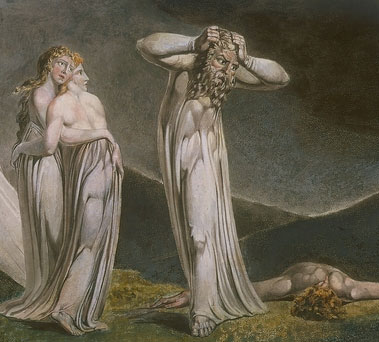The Significance of Adah and Zillah
“Peter came to Him and said, ‘Lord, how often shall my brother sin against me, and I forgive him? Up to seven times?’ Jesus said to him, ‘I do not say to you, up to seven times, but up to seventy times seven.’” (Matthew 18:21-22)
Genesis 4 seems to contain two “feast” cycles. Near the end of the first, at “Atonement”, the Lord set a mark upon Cain to protect him from vengeance. As on the Day of Covering after Adam’s sin in Eden, the full weight of the law was withheld. Cain complained that his “liability” was greater than he could bear. Cain was covered but he still went from the presence of the Lord, as the goat which carried the sins into the wilderness. It seems Cain despised mercy.
Just as the Lord and the Land were two witnesses against his crime, he now fled from the face of the Lord and the face of the Land. Only the High Priest could face God, standing in the Veil, the firmament between heaven and earth. Abel was the true facebread, the authorised priest. [1]
You must be logged in to see the rest of this post.
Join now for a year for $15!



























January 19th, 2010 at 11:00 am
Do more with Lamech’s failure to judge between his two wives. What was his assessment to be? I would have thought they were two witnesses against him.
January 19th, 2010 at 11:23 am
Good thinking, but the two witnesses are always male. They are the two cherubim flanking the Ark. The two women are always the two goats. Don’t know how that would go down with BH feministas if there were such a thing.
The High Priest basically tossed the dice (the urim and thummim), so the Lord chose the goat. The last time the lot was drawn was just before the Spirit baptism at Pentecost, so now WE get to decide. We judge between the goats. For more on this see:
http://www.bullartistry.com.au/wp/2009/05/20/a-white-stone-3/
under the subhead “The word is ‘Yes’”
So, under the New Covenant, if you find yourself having to choose between the affections of two women, you don’t need to toss a dice. ; )
January 19th, 2010 at 12:39 pm
You mean “toss a die” and you still didn’t explain for my poor brain what he had to choose between them for. I get the scapegoat idea but fail to see it in the narrative itself.
January 19th, 2010 at 1:23 pm
It’s structural. Both cycles in chapter 4 follow the Feasts. It’s not that one was evil and one was good in this instance. It’s Lamech’s refusal to choose.
January 19th, 2010 at 3:42 pm
“You mean ‘toss a die…’”
Don’t you usually toss a pair?
January 21st, 2010 at 5:28 am
Yes, but you said “a” dice…..get it? ;^,